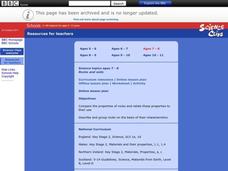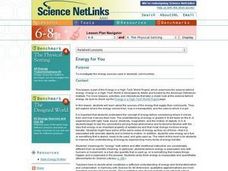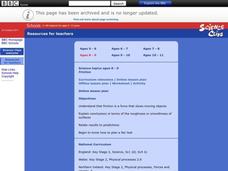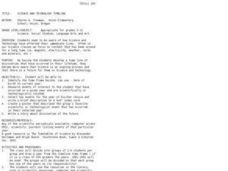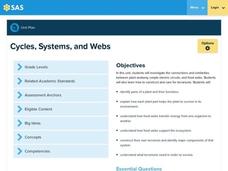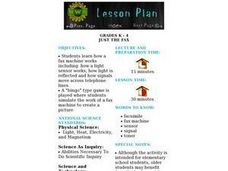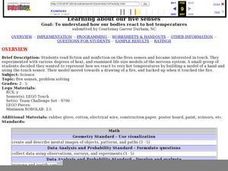Curated OER
Earth, Sun, and Moon
Young scholars participate in a demonstration and complete an online activity that illustrates the earth orbits the sun once a year, and that the moon takes approximately 28 days to orbit the earth.
Curated OER
Teeth and Eating
Students examine pictures of different animals and decide if they eat meat and/or plants. They inspect models of pairs of upper and lower teeth and discuss which teeth are most useful for cutting grass and tearing meat.
Curated OER
Rocks and Soils
Students compare the properties of rocks and relate these properties to their use. They perform a virtual experiment to describe and group rocks on the basis of their characteristics.
Curated OER
Ourselves
Students identify the main parts of the human body. They point to various parts of their own body, cut out pictures of humans and animals and sort them into the two categories, discuss the differences between animals and humans, and...
Curated OER
Habitats
Young scholars complete food chains for organisms in three environments. They use copies of the Habitat worksheet. Students review the food chain terms with the teacher. They research related food chains, and interlink these to form a...
Curated OER
Energy for You
Students investigate the energy sources used in student's communities. They explore where the energy comes from, how it is transported, and the uses to which it is put. They review the meanings of vocabulary renewable and newable resources.
Math Mammoth
Decimal Problems
In this math worksheet, students are given tables and story problems with decimal points. Students must use the tables and story problems to find 10 answers about the data.
Curated OER
Micro-Organisms
Students investigate micro-organisms with an on line activity. In this micro-organism on line lesson plan, students identify bacteria, viruses and fungi projected onto a white board. Students work in groups and use a computer and an on...
Curated OER
Interdependence and Adaptation
Fifth graders construct a food web to illustrate how animals and plants are interdependent. For this interdependence lesson, 5th graders identify how consumers, producers, herbivores, carnivores and predators are related in a habitat....
Curated OER
Forces in Action
Students investigate questions centered around force and motion by going through the scientific process and creating fair tests and experimentation. In this instructional activity about forces-in-action, students diagram their findings...
Curated OER
Reversible and irreversible changes
Students experiment with solids and liquids to find which solids will dissolve in water. This dissolution and mixtures instructional activity can be completed online or in class as all materials are connected to the lesson plan for both...
Curated OER
Sorting and Using Materials
Young scholars explore materials and their properties. In this matter lesson, students identify objects and describe their properties. Young scholars test and sort materials using an interactive whiteboard, followed by a group discussion...
Curated OER
Friction
Students compare and contrast the movement of objects on different surfaces, experimenting with friction and forces of motion. This friction lesson has numerous online tools including worksheets and virtual activities; the option is also...
Curated OER
Science and Technology Timeline
Students develop a time line of discoveries that have occurred in their lifetime. In this time line lesson plan, students research scientifically or technologically related events of interest to them, write a brief description on a 4x6"...
Curated OER
How We See Things
Students investigate how mirrors reflect light. In this reflection lesson, students draw the path of the light reflected from a mirror. Students construct a list of objects that are light sources.
Curated OER
Unit Conversions-Energy, Power, Flux
In this unit conversion instructional activity, students solve 4 problems given a list of conversion factors for units of energy, power and flux.
Curated OER
Building a Terrarium System
Students create their own terrariums. In this ecological model lesson, students create terrariums using soil, seeds, pebbles, and two liter bottles. Students compare the elements of a terrarium to a food web.
Pennsylvania Department of Education
Cycles, Systems, and Webs
Fourth graders review the parts of the plant and their functions. In this plant lesson, 4th graders recognize that plants must transfer energy to make food. Students understand the interdependence of organisms in an...
Curated OER
Searching For Power
Fourth graders explore different forms of energy and discover ways that natural resources are important. They research how your town would be affected by building your type of power plant.
Curated OER
Powering a Green Earth
Learners compare and contrast renewable and nonrenewable energy. In this environmental science lesson, students discuss the importance of going green. They identify the different components in a power grid system.
Curated OER
Ionic Compounds
In this compounds worksheet, students review the structure and properties of ionic compounds, their formulas and nomenclature, and molecular mass and percentage composition. This worksheet has 4 short answer questions and 7 problems to...
Curated OER
Just The Fax
Students discover how a fax machine works including: how a light sensor works, how light is reflected and how signals move across telephone lines. A "bingo" type game is played where students simulate the work of a fax machine to create...
Curated OER
Can You See the Music?
Fourth graders examine the makeup of the electromagnetic spectrum and how the various forms of EMRs are similar and different from each other. They, in pairs, solve problems from worksheets imbedded in this lesson plan.
Curated OER
Learning About Our Five Senses
Students study the sense of touch and various degrees of heat. They design a model that displays how the human hand reacts to heat using a touch sensor.




